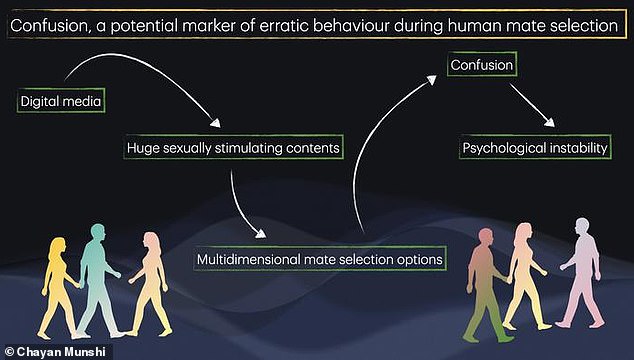Can’t Find ‘The One’? Scientists Reveal New Phenomenon That Makes It Harder to Form Serious Relationships
Research shows that a new phenomenon has recently emerged that has made it more difficult for people to find ‘the one’.
Researchers found that young adults are experiencing “social media confusion” caused by the platforms and dating apps.
According to the researchers, the sites increase temptation and desire for a new partner, making people less likely to stay in a relationship.
Additionally, users are exposed to more attractive and wealthier people than ever before, distorting their expectations of a potential partner.
The team found that people between the ages of 18 and 30 value “fun” over long-term stability.
Researchers found that young adults are suffering from ‘social media confusion’ caused by the platforms and dating apps that have distorted the way people assess their options – even in current relationships
“People’s choice of mate is a complex psychological process, which is effectively influenced by multiple societal factors including physical appearance, personality and financial situation,” said Chayan Munshi, founder and director of the Ethophilia Research Foundation in Santiniketan, India.
The number of available partners has grown dramatically. An estimated 60 million people in the US used online dating platforms in March, out of the 117 million people who are currently single.
The new research will be presented this week at the annual conference of the Society for Experimental Biology in Prague.
The survey asked participants questions including: ‘Do you feel confused when choosing a life partner?’, ‘What are your criteria for choosing a life partner?’, ‘Do you still look for other partners when you are already in a stable relationship?’ and ‘When choosing a life partner, do you want to switch to a ‘better option’?’
Women reported experiencing more confusion when looking for a partner than men.
But overall, the uncertainty about who was actually available to date affected their ability to evaluate a potential partner.
People who are already in a relationship may download a dating app to explore other options. “There is a marked impulsivity, for example, and a decrease in in-person social interactions,” Munshi said.
“This exposes confusion when people are looking for a partner and it can be difficult to maintain a relationship.”
Furthermore, the increase in sexually stimulating or attractive content has led to people having a distorted view of what they expect from a potential partner, for example in terms of appearance, personality and financial situation.
Thanks to the advancement of artificial intelligence and filters, people are making their photos look better than the rest, with smoother skin, lusher hair and other attractive features.
A woman said she came across a profile with an enhanced photo and told Fashion: ‘I was feeling cheeky, so I texted him, ‘Is this AI?’
“He was like, ‘Yeah, can you see it?’ I thought it was a little nerve-wracking. Then I worried about other women, who might not be as media-savvy and not be able to see it.”
This exposure “creates certain perceptions of reality in the young mind, which ultimately leads to confusion in selecting potential partners,” Munshi said.

Women reported experiencing more confusion when looking for a partner than men, but overall, people’s uncertainty about who was actually available to date affected their ability to evaluate a potential partner.
However, the study authors noted that more research is needed to better understand how societal demands are making young adults feel pressured in the world of online dating.
The findings show that the ‘pleasure index’ or ‘adrenaline rush’ in relationships has become more important than ‘long-term stability’, which could impact young people’s mental health.
‘It is disturbing that impulsivity or confusion can lead to instability in human behavior regarding maintaining relationships, which actually affects people’s normal social behavior.’
“The pattern is now striking enough to suggest that this could be changing social norms for mate selection behavior in young people, which could have a significant effect on brain-behavioral circuitry,” the study author said.
‘In the long run, this could ultimately change the fundamental protocol of evolutionary mating strategies.’
